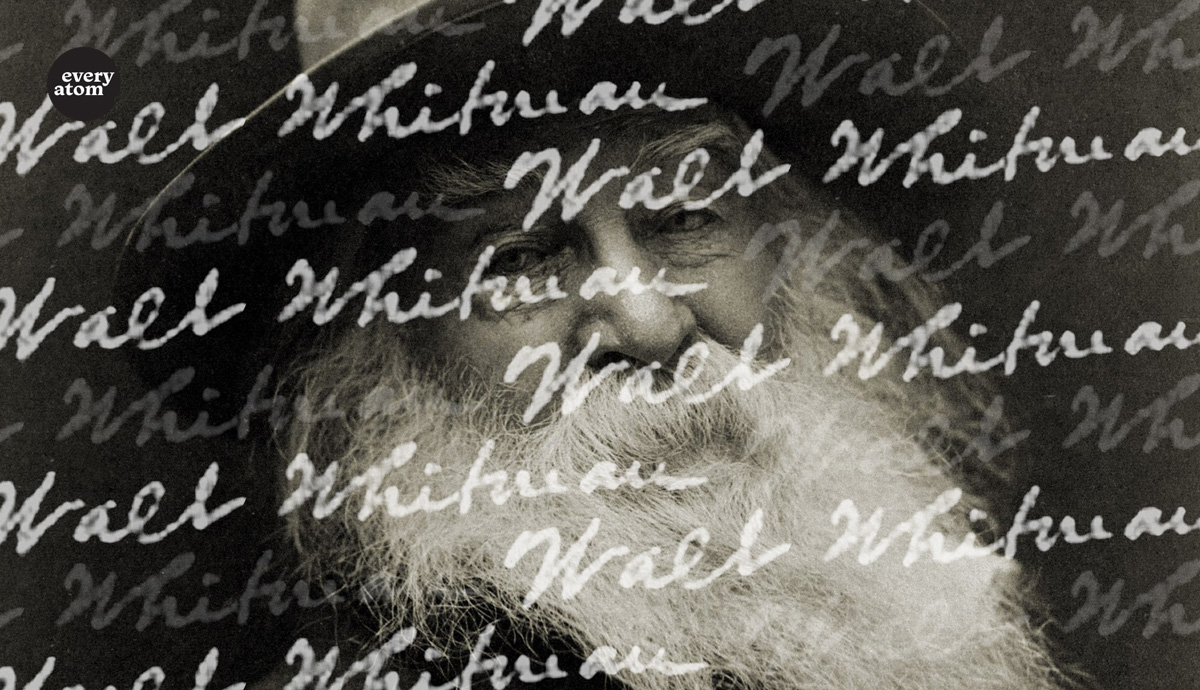Every Atom | No. 120
Introduction to Every Atom by project curator Brian Clements
In “Tradition and the Individual Talent,” T.S. Eliot famously claimed that not only are new works of art inextricably connected to what came before, but past works are changed by what comes after: “[it] is not onesided: what happens when a new work of art is created is something that happens simultaneously to all the works of art which preceded it.” Though Eliot may not have specifically wished this for Whitman, whose work he didn’t love, Whitman would, I think, have been overjoyed to see future poems, and sightings of him, rippling back through Leaves of Grass. I imagine him particularly amused by the future versions of himself: sweating on a reservation basketball court in Sherman Alexie’s “Defending Walt Whitman”; or selling hot dogs and Pepsis with a “vain old ducktail, deliciously / Out of style” or running the county fair Tilt-a-Whirl, in Larry Levis’ “Whitman”; or “poking among the meats in the refrigerator and eyeing the grocery boys” in Allen Ginsberg’s “A Supermarket in California”; or converted into Sharon Old’s female speaker’s “exceptional heroic body.”
Whitman claimed that he would exist through time; we could still find him under our bootsoles: wherever we were in his present and future—though I cannot really imagine reading Whitman in his present, and not, first, 130 years later as a teen girl on an Arkansas hillside in a house surrounded by the thick chirping of insects, and the humid-with-August, ankle-sticking grass that he imagined and reimagined for me. He was, of course, speaking directly to me. He, more than any poet I’d ever read, had found me—reaching from his present hour into mine. And in the years since, as I have read and re-read him, I have also taken so much pleasure in seeing where other poets have found him. They both prove his legacy and, when we re-read “Song of Myself” with them in mind, bring fragments of “the present hour” into it, layering our America and our Whitmans again and again on top of his.
Federico Garcia Lorca’s vision of Whitman with his “beard full of butterflies. . . corduroy shoulders worn thin by the moon” is right there looking out from “Song of Myself” at us. Or we hear June Jordan beside Whitman, calling on “the eddies of the wind,” “Listen to this white father; he is so weird. Here he is calling aloud for an American, a democratic spirit . . . that could morally constrain and coordinate the material body of USA affluence and piratical outreach, more than a hundred years ago.” In this way, Whitman’s poem never stops revising; he keeps reentering it, as we do. Or as he also says, “I am the clock myself.”
Recommended
Nor’easter
Post-Op Appointment With My Father
Cedar Valley Youth Poet Laureate | Fall 2024 Workshop







